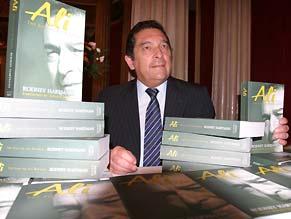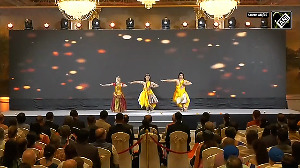 Dr Aron 'Ali' Bacher was in Mumbai last weekend to launch his new book, Ali - The Life of Ali Bacher.
Dr Aron 'Ali' Bacher was in Mumbai last weekend to launch his new book, Ali - The Life of Ali Bacher.
Dr Bacher, of course, was the face of South African cricket during its most memorable, revolutionary and dangerous periods.
Even Nelson Mandela acknowledges Dr Bacher's contribution to the process of change by leading and overseeing the integration and transformation of the game in the country.
Ashish Magotra caught up with the former South African cricketer and ex-chief of the United Cricket Board of South Africa.
In his biography, White Lightning, Allan Donald talks about the frustration of not being able to play international cricket because of apartheid. He also talks about how you kept telling him to wait just a little longer. Was this a dilemma you faced with many South African cricketers?
Allan Donald was a genius and a very, very good fast bowler. If he wanted to, at that time, he could have played for England. He had been playing county cricket for a while. The talent was such that he could have been accepted into any team. At that time, I was very close to the South African sports minister, Steve Tshweti, who had spent time at Robben Island [the infamous prison, 12 km from Cape Town, where Nelson Mandela spent 27 years imprisoned] during the struggle for freedom. Due to my close contact with the minister I knew that the unification of the two cricket Boards, the South African Cricket Union and the South Africa Cricket Board, would happen sooner than expected.
The African National Congress came to power in 1994, but much before that the Boards were united and it was clear to all that it would not be long before South Africa would be playing international cricket. Allan wanted to play for South Africa and I only gave him all the encouragement I could.
As an administrator, what was the most exciting time in South African cricket for you?
The nineties were an exciting, breathtaking era for our country. India came on an official cricket tour, we were firmly on the road to democracy, Nelson Mandela was released. So much was happening and it was all positive. Everything was moving in the right direction.
What was India's role in your acceptance back into the international fold?
The year was 1991, when India proposed our return to the International Cricket Council. India extended a hand of friendship even when others were skeptical. So their contribution to our cause has been great.
In 1948, when the National Party came to power and forced the blacks into so-called homeland, India was the first country to close their embassy. Incredibly, they were also the first back when the apartheid era came to an end. They were also the first black team to play in South Africa.
It is said South Africa will never have an all-white team playing at the international level.
The quota system does not exist at the international level. The facilities in the coloured areas are inadequate; there's no doubt about that. But we are trying to rectify that.
How bad were the conditions for black cricketers during the apartheid era?
It was very bad. Things were tough for them; there was hardly any money, no sponsorships for them. They were confined to separate homelands throughout the country. On Sundays they could not play on the white man's grounds. If you visited the Wanderers Stadium, there was a segregated section for blacks. Apartheid was degrading; it was an abuse of human rights. Separate buses, separate toilets, separate schools; it was truly appalling. And we are all glad that era is over.
Who, according to you, are the five greatest South African cricketers?
Graeme Pollock, Barry Richards and Mike Procter are without doubt the best South Africans I have seen playing the game. And I have seen a lot. Since 1961 I have been involved with South African cricket and I believe these three stand head and shoulders above the rest. Allan Donald also deserves a place among them, but the verdict on the rest is still out.
The betting scandal: how shocked were you, considering the fact that Hansie Cronje was a protégé of yours?
I feel I had experienced a terrible nightmare. I think ahead. If I have made mistakes, which I have, I rectify them and never look back. I go day by day.
Life goes on. We have dealt with it. I think this was the biggest scandal to ever hit cricket. It was bigger than the Packer Revolution; bigger than Bodyline; bigger than anything cricket had ever seen!
Do you think we will ever do away with it?
I met Lord Paul Condon, head of the ICC's anti-corruption unit, and he said it was suppressed. He did not say it is part of the past or that it is over, but he said it is suppressed. And that's what I am willing to believe -- it is suppressed, not over. If the administrators take their eyes off the ball it can resurface again. It is very important to concentrate our energies on eradicating match-fixing.
India and Pakistan playing again. Does that mean anything to you?
Passion for reconciliation brought backs and whites together in South Africa. It is cricket that has brought a spirit of reconciliation between India and Pakistan. I wish to congratulate the Boards of both countries for the efforts they have put in. Watching India-Pakistan play is one of the great joys of international cricket. Without it, cricket feels incomplete.
As an administrator, what is your take on the throwing and illegitimate actions?
People with illegitimate actions have played cricket for years. In our time, we had Tony Lock, Charlie Griffith. In every era there has been one. As far as I am concerned, there is no agreement as to the exact nature of the rule. There is no uniformity. For example, Steve Waugh thinks Muthiah Muralitharan's action is legal, but there are others who don't think that is the case.
There is no real solution to the problem. Who is a 'chucker' and who is not? Who will tell and who will believe?
What do you think about the current South African team? Where do they stand in the international hierarchy?
We have lost four of our most experienced cricketers -- Allan Donald, Jonty Rhodes, Daryll Cullinan and Gary Kirsten. This team is in a transitional period. In the next few years, I think they will do very well.
I think [Graeme] Smith is an outstanding captain at the age of 22. Back home there was huge criticism initially when he was named captain. But he has impressed me by speaking about the integrity of the game and his passion is unbelievable. With the support of [Shaun] Pollock, [Jacques] Kallis and the rest of the team, we should be back at the top again.
Photograph: Jewella C Miranda







 © 2025
© 2025